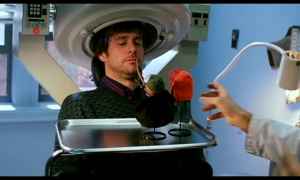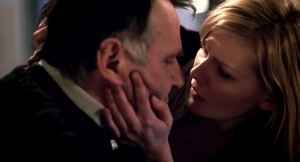The Eternal Sunshine of the Spotless Mind: Memory and Association

Lacuna is a company in Michel Gondry’s film The Eternal Sunshine of the Spotless Mind, which offers a procedure to have specific events removed from one’s memory. Both main characters, Joel Barish and Clementine Kruczynski, opt to have this procedure following a painful breakup— each therein erasing the memory of the other. The word, “lacuna” itself means gap or emptiness which, as the story reveals, is exactly what the service provides. The film shows associations, bridges by which memories are interconnected, still persist even after the deletion of the memories to which they are tied. Eternal Sunshine offers an intricate mix of psychological and philosophical subjects that help underscore the importance and influence of association. The film plays with the ideas of of memory, society, and perception, questioning the balance of association’s effects on a character, and a character’s effect on the memories they form.
The first scene shows Joel skipping work, he says that he does not understand why he does this, and further that he is not an impulsive person. As the story progresses, this claim shows all too true. It is only after Joel encounters Clementine, a enthusiastically spontaneous character, that he begins to shed these layers of insecurity. Even as it is revealed that Joel’s memory has already been erased, the story shows that this seemingly impulsive course of action is triggered by a remnant of his past relationship. This suggests that even with his memory removed, the associations that persist after the procedure drive the character to change.

Before undergoing the erasure process, a session of brain mapping is required in order to pinpoint the target memories. This is accomplished through a series of association with artifacts from Joel and Clementine’s relationship. The mapping shows the location of memories related to the objects shown. The deletion of these memories is meant to enable the advertised “spotless mind.”
The receptionist of the company, Mary Sevevo, recites several literary quotes underscoring this idealized bliss of the forgetful. As it shows, the reality is not so clean; those who undergo the procedure are not content with their loss, but are left instead a canvas with holes. One critique of the film creates this analogy, “a relationship is a loom. It weaves lives into one another. Just how much unweaving you would have to do in order to erase all traces of one is unclear” (Reeve, 18). This helps underscore the film’s use of association as an innate structure of human memory.
This is displayed in Joel’s journey through his subconscious as the erasure procedure takes place. The progression is that of the paths constructed earlier and is not linear, but still traceable through Joel’s mind. The presentation of both Joel’s internal memory and consciousness as aware of what is happening offers insight into his relationship with Clementine and his growing regret of having chosen to undergo the procedure. Rather than the blissful ignorance the procedure seems to offer, Joel is conscious to his loss twice over.

In Clementine the procedure is seen as something of a restart button. Her hair marks her emotions and perspective. In the course of her relationship with Joel her hair changes from its initial blue, to red, and then orange. When she encounters Joel after her procedure, her hair is once again blue. The repeat of the color, titled “blue ruin,” suggests that she has reverted to her mental state prior to their meeting.
The use of cinematography underscores this feeling of loss created by the purge of even unhappy memories. The fluid transitions connecting many of the memories within Joel’s internal narrative adds to the theme of association. The character focused perspective offers a stream of consciousness as the setting shifts from one memory to another. One prime example is the scene in which Joel as an infant is bathed in the sink; the scene quite literally flows to the next as the characters are pulled down the drain to the next setting.
The fluidity of the consciousness is juxtaposed with increasingly choppy effects signifying the memory removal. Earlier in the film, the memories fade gradually to white, but as Joel’s consciousness fights harder to retain his memories, chunks and whole constructs are deleted rapidly. Layering the linear consciousness over a constantly changing backdrop helps display the way in which the character associates his inner timeline as a series of events, and further helps to display the effect the procedure has on Joel’s character.
The cinematic depiction reflects psychological perception– the further-reaching memories are stark, with fewer and fewer details. The film itself embodies themes and ideas of physiology and philosophy— “Gondry’s work reinforces the perspective not only of a great deal of research in empirical psychology but of a long phenomenological tradition in philosophy” (White 108). All these implementations help to create associations between memory and reality, and display how they come together to form complex characters and their struggles.
The scenes in the external world (that is to say- not in Joel’s subconscious,) follow patterns of circularity. Clementine, though impulsive, unknowingly aims to reenact the events of her relationship with Joel. She wishes for the memories she lost and attempts to recreate them. One analysis of the film suggests that “memories are so intricately and complexly interwoven that one must purge all memories connected with a given individual or relationship if the procedure is to have any chance of success” (Jollimore 37). While this idea is on the right track, it may be more accurate to call for complete erasure of the wants and desires of the character undergoing the procedure. We see in Clementine, even with all evidence and memory of the relationship gone, a characteristic instinct to pursue the very thing she aimed to lose.

This nonlinear format is shown differently in Joel’s memories as he tries to hide his manifestation of Clementine in his childhood. Though inevitably erased, the scene shows the malleability of memory. This redefines the idea of fluid memories, it shows that not only is the course of memory nonlinear, but also changeable and altered without necessarily being destroyed.
In both his childhood memories and his relationship with Clementine, Joel’s major hurdle are his insecurities. His memories and wants as a child also help to explain his psychology as an adult. He is eager for attention, but does not demand it; he would rather wait to be acknowledged. It is only after he meets Clementine that he becomes incrementally more open, an openness which he loses as a repercussion of the procedure.
When they re-encounter one another, this aspect of his personality is revealed again; he asks himself “Why do I fall in love with every woman I see who shows me the least bit of attention?” This displays Joel’s reversion to his feelings of unfulfillment. Joel’s want of acknowledgement, but fear of taking action, makes him, as he describes, “boring.” In many ways, Clementine is the exact opposite; though she too craves attention, she treats this want as an objective rather than an obstacle. This trait manifests in the characters erratic behavior (e.g. breaking into an empty beach house in her first encounter with Joel, and her constantly changing hair color.)
Though she is a mercurial character, Clementine is also perhaps the most rigid in the sense that her want and need to change is never altered. In fact it is this blatantly verbose character that allows Joel to remain influenced by Clementine even after her erasure. Joel’s perception of Clementine is so vivid that he is able to recreate her within his mind. She gives him the support, enabling the realization of his want to retain the memories of her. This shows an association of characters and how they serve to define one another.

In these ways change is displayed as both good and bad. Change at the hands of interpersonal interaction is growth, while the change from the procedure is regression. One of the best examples of this is Mary’s character. She offers several quotes in praise of the bliss offered by the procedure that her company offers, however her character arch shows the flawed implications of the procedure. She repeats her blunders of falling in love with her boss. In altering her memory, the loss offers her an escape from the emotional pain, but disallows any growth or closure. Because of this, Mary inevitably to repeats her misstep. Her drastic change, however, comes not from erasure, but from realization of the procedure’s faults. She is able to denounce the company and seeks to restore the grievous losses of the patients.
It is notable that each character that undergoes the procedure is shown to follow some trope of their forgotten hardship. One analysis offers that it is human nature to want to accept hardship for the want of making an impression on the world. This is the idea of the “experience machine”- people will not choose complete pleasure over having the opportunity to create an influence or reality in itself (Grau 121). In the final scene in Joel’s mind, he is aware of his memories being taken, yet it is the association of this loss that stays in the subconscious of this character and allows him to retain some inkling of his relationship with Clementine. This human want of experience over ignorance can be seen as a means by which Joel is able to overcome the full effect of the procedure, thereby allowing him to retain some association with Clementine.
The intricate story, characters, and cinematography of Eternal Sunshine of the Spotless Mind display and evoke complex psychological and philosophical themes that deal with the value and necessity of associations and experience as part of personal and interpersonal development. It suggests that the experience of grief is necessary for growth, and displays the faults of ignorance.
Works Cited
Grau, Christopher. “Eternal Sunshine of the Spotless Mind and the Morality of Memory.” Journal of Aesthetics and Art Criticism 64.1 (2006): 119-33. JSTOR. Web.
Jollimore, Tory. Eternal Sunshine of the Spotless Mind. Ed. Christopher Grau. London: Routledge, 2009. Print.
Reeve, C.D.C. Eternal Sunshine of the Spotless Mind. Ed. Christopher Grau. London: Routledge, 2009. Print.
White, Stephen L. Eternal Sunshine of the Spotless Mind. Ed. Christopher Grau. London: Routledge, 2009. Print.
What do you think? Leave a comment.











Such a great article! I think if I had the chance, I wouldnt choose to forget. Individuals grow through pain and from it, gain wisdom.
Lovely article on an amazing film! One of my personal favorites, it abolutely blew my mind! Jim Carrey’s dramatic performance in this is excellent, showing how good and diverse he is as an actor. And Kate is magnificient, as always 🙂
Thank you so much! When I was amazed at Carry’s performance, it was my first time seeing him in serious role and he was just great along side the rest of the cast.
The lessons learnt from this movie is exactly what helps me through my hardest times and any relationship troubles I’ve had in my life. I absolutely love the approach you took to “reviewing” the film so-to-speak. Great article!
Eternal Sunshine will always be one of my favorite films. One thing that really stood out with this film though, for me, is the music. Jon Brion composed something like I’ve never heard before, and the emotions that come with the music fit perfectly with what’s happening in the film. The way I feel when I hear any of the music from Eternal Sunshine is impossible for me to describe. Another thing that makes this film so important and beautiful is that everyone involved gave it their all. From the score to the performances, to the writing, directing, and editing – it’s a collective work of true geniuses.
The compositions are amazing, the whole soundtrack is just really evocative. I really wish I would have included something about the music because there is a really deep connection with the music and the ideas in the story. I can’t help but thinking of the film when I hear anything off of the soundtrack and the Brion pieces are just beautiful. Thanks for the comment!
Don’t get me wrong, I absolutely LOVE Jim Carrey in a comedy more than anyone but I think when he is serious in a role, it hits us right down to the bone. Not only is this one of his best movies, this is one of my all time favorites…
Eternal Sunshine of the Spotless Mind is definitely his best movie and my 2nd favorite of all time.
I already sort of said this but I agree- Carrey’s performance was amazing in the film, the role really displayed his versatility as an actor. I’m also really impressed with the casting decision, it was innovative and ultimately rewarding choice to offer him the script- though after his performance in the Truman Show, I can see where they were coming from. Just out of curiosity what is your first favorite? Thanks for the comments!
Robin Williams in “One Hour Photo.”
I enjoyed watching this – and it’s at a poignant time in my life, in terms of personal life, too.
The movie was amazing and the cinematography was so strange and beautiful, it gave this movie the right atmosphere! There should be more female cinematographers like Ellen Kuras!
I love the color palette, and the hand held style gave it warmth and ambience.
I totally agree, the whole mise en scene of the film is amazing, I absolutely love Ellen Kuras (almost as much as I love Robert Yeoman.)
Great analyses! I read the script before the film was released and loved it then, love it now.
I wish I had enough hair and enough money to dye my hair for each wild and crazy relationship I’ve been in. I’m not a fan of the guilt it would require to desire to have memories removed. Those Coulda-Shoulda-Wouldas will eat your face off. No regrets! Pass the hair dye!
interrogatingideologywithachainsaw.blogspot.com/
It’s my favorite romance and favorite movie of all time. It has some of my new favorite songs ever (Drive In and Phone Call) in the soundtrack and it’s my favorite Jim Carrey movie.
Reading this reminds me how much I enjoyed it on my first viewing. I usually don’t care for the romantic drama type films. This movie is unlike any other and really hits home with something that just about everyone can relate to.
This film is really an interesting mix of psychological/high-concept science-fiction/romance/dark comedy all in a wonderful balance that I think keeps it interesting for different audiences. Thanks for the comment!
I have not seen this movie in awhile; I think I had it on VHS. I judge a movie by how long it haunts me and makes me think of it, demanding a bit of my attention. This movie is one that haunts me in a good way. It makes me examine and appreciate little things in life that may get overlooked and the fortunes I do have at hand. I was astonished by Jim Carey’s dramatic performance. I remember him in the television show “In Living Color” and the movie “Earth Girls are Easy” his ability to range from comedic to dramatic is exhilarating It is too bad he has to make his living in the overly comedic range. That is what seems to appeal to the masses. I think you sum up the film very nicely with your words. “The intricate story, characters, and cinematography of Eternal Sunshine of the Spotless Mind display and evoke complex psychological and philosophical themes that deal with the value and necessity of associations and experience as part of personal and interpersonal development. It suggests that the experience of grief is necessary for growth, and displays the faults of ignorance.”
There are a lot of layers to this film and I think that is what makes it so redolent and enduring. I’m amazed by actors who excel in parts outside of their usual roles. The best examples of this I can think of off hand are (of course) Jim Carrey in this film, and Bruce Willis in Twelve Monkeys. I think both actors are really well known for their big budget roles but underrated for their acting potentials. Thanks for the comment!
When I walked out of the theater the first time I saw it, I realized that I spent the entire time on the verge of tears. 10 years later, it’s my favorite movie, and I’m blown away at how, no matter how many times I watch it, I’m still moved like I was that first time.
I really wish I would have thought to submit this in time for the 10th anniversary (but two months too late isn’t actually too late is it?) But it definitely a film that withstands the test of time. Thanks for the comment!
It’s a tear jerker.
Not a big fan of movies about romance, but I absolutely love Eternal Sunshine. It’s a film that hits so close to home for so many people, and your article does a great job of explaining how it deals with memory and personal growth.
I recently watched this film and it definitely deserves a place in my top ten list, it is such an unpredictable film and it takes you on such a journey whilst watching it.
Good article that talks about a great movie. I really liked some of the insights that you had such as Clementine reverting back to her blue hair after she has her memory erased, which would suggest that she reverts back to her original mind set before she and Jim Carey’s character met.
Christina,
I have not seen this movie, but I enjoyed your discussion of it. Your transitions were pretty smooth, but your sentence structure gets a little shaky toward the end. Maybe give it another once over?
I am now interested in seeing the movie. Thank you 🙂
-Athina
Thanks for the comment! Sorry it got hard to read I’ll try to improve my editing the next time around. I’m really glad the article managed to pique your interest in the film! I hope you enjoy it!
There is something very beautiful in the idea of giving meaning to suffering, that, as you say, “the experience of grief is necessary for growth, and displays the faults of ignorance.” At the same time, I do wonder if that’s entirely true. (In the line of this thinking, the questions would look like: is all suffering necessary? how much suffering is too much suffering? aren’t there lessons that can be learned without suffering, or with lessened suffering? For example, what kind of “personal growth” can be had by seeing my family slaughtered, and would that kind of grief be “necessary” for any kind of personal growth I’d could attain?)
One line that really struck me in the film comes from Clementine in the scene where Joel first asks her out in the bookstore. She says, “Too many guys think I’m a concept, or I complete them, or I’m gonna make them alive. But I’m just a fucked-up girl who’s lookin’ for my own peace of mind.”
I think it’s common for films to have this male protagonist and a quirky girl whose only real purpose is to aid in his development (get him out of a depression, make him less shy, etc.). Clementine’s statement to Joel then is a proactive warning against this trope. Yet, when we reach the end of the film, I still feel as though Joel sees her as someone who will save him.
At the end of the day, if we’re talking about personal growth, I think my questions would be, if Joel had not elected to not erase his memory of Clementine, do you think he would have gone through a period of personal growth? When he and Clementine enter into a relationship for the second time, will it end with memory erasure again, or will something come of it? And who/what do you think will decide the outcome?
You raise some really great questions and ideas! I think there is something to the fact that while specific memories can be erased, the connections between memories are not. Still, as we see in Mary, there must be some emotional trigger to which the erased memories were connected in order for some growth in the character. In this way, perhaps, things are changed through the memory of emotions. Remember too that it was not just suffering that was erased but all his happy memories with Clementine as well. Maybe it would have been better of me to say simply say “experience is necessary for growth.” In this way, I don’t think he sees Clementine as a person who will save him but rather “change” him, and in this way perhaps she is still a concept. The very fact that she is a character in his head makes her a in fact a concept, but we also see her develop as a character. The difference then between a character and the concept trope, then becomes the realization of faults and emotions beyond the self, allowing a sort of symbiotic growth.
On this basis, I would speculate that Joel in both cases, with and without the erasure, would have experienced some form of growth, but the two would end up in very different life places. Memory-erased Joel reverts to the mind set where meeting Clementine is something he is driven to experience. On the other hand, Joel with memories is beyond his initial infatuation with her, making something of a psychologically-temporal disconnect.
I think that, as the story stand, there is a greater chance for the relationship to change than there is for it to repeat because of the the retained emotions and the fact that the characters in someways have been shown to act as emotional triggers to one another. My suspicion is that their relationship will form more rapidly than their first go-round and this will change the course of the relationship. I hope this makes some sort of sense! Thanks for the really though provoking comment!
I absolutely adore this movie. Thank you so much for your piece! What I love most about your article is this statement: It suggests that the experience of grief is necessary for growth, and displays the faults of ignorance.
I’ve always connected to this movie because of that, only I didn’t have such explicitly laid out words for the feeling. Thanks so much for your analysis and reflections, excellent article!
I have seen Eternal Sunshine of the Spoteless Mind few months ago, and I really did like it. It is November 2015, I have seen movie again, and I cant stop thinking about how amazing movie it actually really is.
My parents saw the movie with me, when I was watching it again, but they didnt get it so they obviously didnt like it that much. Well, I have to admit, each time I read another film analysis about Eternal Sunshine of the Spoteless Mind or rewatch some part, I like it even more.
You bring many insightful ideas to this analysis. “The Eternal Sunshine of the Spotless Mind,” is a great film, and it can be challenging to explore and examine in depth. Though there were times that I found the over summarization of the film irksome, in giving it a second read, I can definitely comprehend why it was necessary. Thank you for conveying your ideas.
I especially love your use of Grau’s article. It’s one of my favorites! He makes interesting comments about how philosophers would perceive memory erasure. Utilitarians would suggest that the procedure is morally justified if it brings about the most happiness, while other philosophers would probably see the procedure as a limitation of personal freedom (Kant) or the removal of our ability to examine the truth of our reality (Murdoch).
Nozick’s thought experiments identify the happiness vs. experience dilemma you mention in your insightful article. Most of us want a meaningful life, rather than a life devoid of pain.